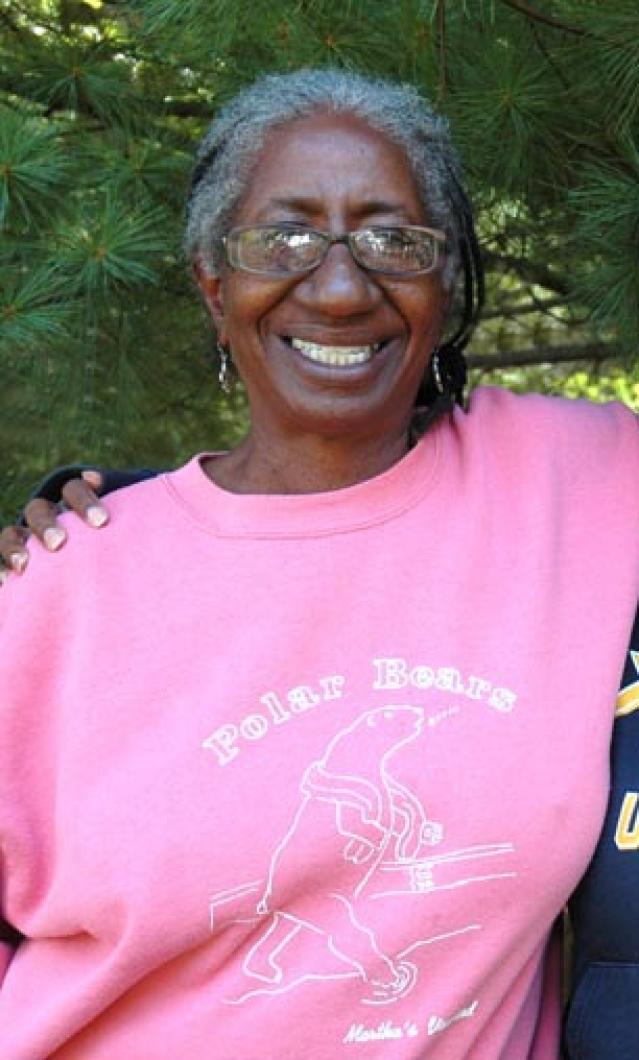On July 1 Caroline Hunter of Oak Bluffs will receive the Rosa Parks Memorial Award from the National Education Association in Washington D.C. to honor her work in social justice, as well as her long career in education in the Cambridge school system. And just this past Wednesday, at a ceremony in Cambridge, Mrs. Hunter also received the Amandla Award from the nonprofit advocacy group, South Africa Partners.
Mrs. Hunter’s road to recognition began quite unexpectedly. In 1970 she was working as a chemist developing photographic chemicals for the Polaroid company when she met her future husband, Ken Williams, a night-shift assembly line worker at the company, and self-taught photographer.
“Word had gotten around that there was this black guy who was taking better pictures than the professionals, all of whom at that time were white,” remembered Mrs. Hunter. Mr. Williams eventually landed a job as a photographer in company’s advertising department.
One day he and Mrs. Hunter noticed a mock-up of a South African identification card on a bulletin board in the corporate offices. The image on the bulletin board was meant by the company to highlight the work they were doing around the world. Mr. Williams and Mrs. Hunter viewed the identification card account from a vastly different lens.
“Blacks in South Africa had to carry [an identification] passbook,” said Mrs. Hunter. “The passbook was seen as an extra pair of handcuffs and a direct arm of the repression of the apartheid regime. A passbook contains your life history. You had to have stamps as you moved from place to place, and to be in certain places. If you didn’t have your passbook on your person when the police came to check, you could be arrested and held with no habeas, no notification, no nothing. Our contention was that Polaroid was a critical arm of the South African government.”
On the Saturday night after their discovery, the two returned to the office and covered the bulletin boards, restroom stalls and company parking lots with pamphlets. There was nothing subtle about their message.
“Polaroid imprisons black people in 60 seconds,” the pamphlets read, lifting language from Polaroid’s own marketing materials.
Polaroid countered with memos to employees denying their complicity with the apartheid regime. Mrs. Hunter and Mr. Williams posted more flyers decrying Polaroid’s behavior and then held a rally in the plaza next to the corporate offices demanding that Polaroid pull out of South Africa, that it denounce apartheid, and that it turn over its South African profits to liberation movements working in that country.
“We were the first black workers to link labor to South Africa, to show that kind of solidarity,” Mrs. Hunter said. “We saw ourselves as trying to help fight a bully. Instead of having people in South Africa fighting all of the corporations, the majority of which were from the U.S., as well as all the other structures the regime had in place, we were basically saying, alright, let’s help them at least have a fair fight.”
Polaroid did not feel the same way about their cause and fired them, also warning former coworkers not to associate with the two.
Mrs. Hunter and Mr. Williams continued to lead an international boycott movement of the company, one that would eventually result in Polaroid’s withdrawal from South Africa seven years later, beginning what would become a cascade of corporate divestment from the country that precipitated the fall of the apartheid regime. But her dismissal from Polaroid also signalled the start of what she saw as a more meaningful career in education.
“While I enjoyed my work there [Polaroid], I didn’t find it emotionally rewarding,” she said. She and Mr. Williams began volunteering in the Boston public schools during the tumultuous period of busing desegregation.
“It resonated with Ken and me,” she said. “We said, ‘why are kids sitting in the classroom with their coats on? Or, why was the clock not working? Or, why was the teacher reading the newspaper while the kids are shooting craps in the middle of the room?’ Everyone told us, ‘oh, don’t worry about it.’”
Mrs. Hunter embarked on a 34-year career in the Cambridge public schools where she first served as a math and science teacher, and later, afer earning a master’s degree in education, became an assistant principal at Cambridge Rindge and Latin. Her commitment to social activism did not end with her new career, though. She teamed up with colleagues to produce a report on the inequities in the Cambridge public school system and challenged the district to do more to raise scholarship funds.
Later, in the 1990’s, she watched in near disbelief as the system of apartheid in South Africa dissolved, peacefully no less, thanks to an international movement she helped start. Now she is mentioned in the same breath as Rosa Parks, a fact that leaves her speechless.
“It is just jaw-dropping, awe inspiring, humbling,” she said. “That is like the ultimate. The award is not just for me, it’s for my late husband and the many, many sacrifices we made in our individual careers.”
She says that her own education and the discipline instilled in her by her mother growing up in New Orleans, where she still spends much of the winter reveling in the jazz and cultural milieu of the Crescent City, informed her lifetime commitment to learning and activism.
“When I was little, the school would have a summer reading program and I’d get the ten thinnest books I could find,” she said. “I’d do my reading, return my books, get my certificate and I’d run home and show my certificate to my mother. I said, ‘Look mom, I got my certificate!’ and she’d say, ‘Good, go get another one.’ ”




Comments (2)
Comments
Comment policy »